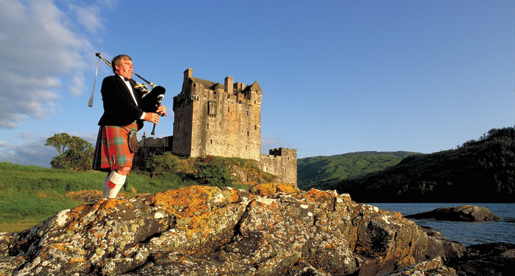Rule Britannia……Scotland never, never, never shall be slaves.
That’s my concise summary of how Scotland’s referendum for independence played out on September 18. While Scottish National Party leader, Alex Salmond conceded defeat, he celebrated that British politics will be unable “to go back to business as usual.” Indeed, with a solid 45% of Scots voting for independence, London must respond by providing Scotland greater autonomy and more attention to its distinct needs and values.
My fascination with Scotland precedes this historic vote. I fell in love with the place and the people when I first visited decades ago. I am not alone in this. I’ve rarely heard anyone say anything less adoring than “I love Scotland” and “I love the Scottish people” after returning from there. This is remarkable since many visitors are greeted by rain (or snow) every day; there are weeks of summer without sunshine. But the stark highland scenery and charming roadside pubs are delightful in any weather. And Edinburgh’s fabulous summer events, particularly the Festival Fringe and the International Book Festival have not only captured many hearts, they are gold-standard models for similar events throughout the world. There’s something magical there, beyond a model democracy.
In the past weeks, it seemed that many other outsiders also cared deeply for Scotland. Opinions on the referendum flowed in from across the world. Top economists warned that current British and European economic conditions made independence a disastrous move for Scotland’s economy. Most convincing for me was Paul Krugman’s September 7 column, titled as if to address a good friend – “Scots, What the Heck?” And while pro-independence activists framed such opinions as scaremongering, I’d like to believe they came from a blend of tough love and undying respect for Scotland and its people.
And since voting on the referendum, Scotland deserves our respect even more. Their voter turnout of over 86% was hailed by the British press as “astonishing” and “incredible.” That’s one of the highest voting rates in the democratic world, in any election or any referendum. Some areas reported turnouts of over 90%. Over 3.6 million Scots came out to participate in their democracy and shape their future.
Looking homeward, only about 60% of the voting eligible population in the US votes in presidential year elections, and about 40% participate in midterm elections. In Arizona, the numbers are even lower: in the 2010 presidential election just 53% of the eligible population voted. Arizona’s voter turnout is consistently below the national average. How sad that so many of our citizens are unwilling or unable to embrace the power of the vote.
We can learn much from Scotland. Although they didn’t make it to independence with their votes, they solidified the inevitably of change. Despite losing the referendum, those 1.6 million who voted YES for independence secured a new future for themselves and future generations of Scots. Voting isn’t always about winning. Sometimes it’s just about the opportunity to be counted.
Want to see some changes in your political landscape? Don’t complain. Vote.
That’s my concise summary of how Scotland’s referendum for independence played out on September 18. While Scottish National Party leader, Alex Salmond conceded defeat, he celebrated that British politics will be unable “to go back to business as usual.” Indeed, with a solid 45% of Scots voting for independence, London must respond by providing Scotland greater autonomy and more attention to its distinct needs and values.
My fascination with Scotland precedes this historic vote. I fell in love with the place and the people when I first visited decades ago. I am not alone in this. I’ve rarely heard anyone say anything less adoring than “I love Scotland” and “I love the Scottish people” after returning from there. This is remarkable since many visitors are greeted by rain (or snow) every day; there are weeks of summer without sunshine. But the stark highland scenery and charming roadside pubs are delightful in any weather. And Edinburgh’s fabulous summer events, particularly the Festival Fringe and the International Book Festival have not only captured many hearts, they are gold-standard models for similar events throughout the world. There’s something magical there, beyond a model democracy.
In the past weeks, it seemed that many other outsiders also cared deeply for Scotland. Opinions on the referendum flowed in from across the world. Top economists warned that current British and European economic conditions made independence a disastrous move for Scotland’s economy. Most convincing for me was Paul Krugman’s September 7 column, titled as if to address a good friend – “Scots, What the Heck?” And while pro-independence activists framed such opinions as scaremongering, I’d like to believe they came from a blend of tough love and undying respect for Scotland and its people.
And since voting on the referendum, Scotland deserves our respect even more. Their voter turnout of over 86% was hailed by the British press as “astonishing” and “incredible.” That’s one of the highest voting rates in the democratic world, in any election or any referendum. Some areas reported turnouts of over 90%. Over 3.6 million Scots came out to participate in their democracy and shape their future.
Looking homeward, only about 60% of the voting eligible population in the US votes in presidential year elections, and about 40% participate in midterm elections. In Arizona, the numbers are even lower: in the 2010 presidential election just 53% of the eligible population voted. Arizona’s voter turnout is consistently below the national average. How sad that so many of our citizens are unwilling or unable to embrace the power of the vote.
We can learn much from Scotland. Although they didn’t make it to independence with their votes, they solidified the inevitably of change. Despite losing the referendum, those 1.6 million who voted YES for independence secured a new future for themselves and future generations of Scots. Voting isn’t always about winning. Sometimes it’s just about the opportunity to be counted.
Want to see some changes in your political landscape? Don’t complain. Vote.


 RSS Feed
RSS Feed